|
Mado Reznik ~ Argentina
|
Share this page: |
| |
|
Statement: "Since childhood she has been very interested in the way people understand each other. Since she wrote her PhD dissertation about infinitesimal calculus and time measuring in language she has been looking for a more scientific way to understand the subject. That was when she got interested in physics.
She makes artist's books in which combines texts and images." |
| |
|
Regarding the death of my mother
By Mado Reznik
Buenos Aires: Mado Reznik, 2016. Second Edition of 10.
5.25 x 8.25"; 60 pages. Photos. Paper cutting. Collage. Translation into English by Christopher Lovelace. Paper covered boards with coptic binding. In slipcase. Numbered. (Originally published in an edition of 2 in 2014.)
Mado Reznik: "Regarding the death of my mother is an artist book where pictures, poetry, and paper are intertwined. The book is divided in four sections where two female voices are heard. These voices are from memory shown through different types of paper and windows that connect lyrical states and pictures. Although the title refers to death the entire book moves around life and its celebration."
$500 (Last Copy) |

Click image for more
|
| |
|
| |
|
The Warranty of Dreams
By Mado Reznik
Buenos Aires: Mado Reznik, 2016. Edition of 10.
6 x 8.5"; 20 leaves text, 4 illustration leaves. Encaustic painting. Monocopies. Numbered. Translation into English by Christopher Lovelace. Bound in paper-covered boards with encaustic painting on cover. Numbered.
Mado Reznik: "The Warranty of Dreams is a book about dreaming and memory through poetry, etchings, and encaustic painting. All these concepts are translated with words, papers, ink and painting. The book serves as a voices' container and transparent etchings are part of the impossibility of saying all."
$500 |
 Click image for more
Click image for more |
| |
|
|
| Sold titles by Mado Reznik: |
|
| |
|
30000, a set of four books
By Mado Reznik
Buenos Aires: Mado Reznik. Set of 4 books, one-of-a-kind.
In these four bookworks Reznik recounts the violence of Argentina’s last civil-military dictatorship. She has centered her work on the 30,000 dead and disappeared. Mado Reznik Remembers 30000 (Artememoria, published March 7, 2019): “The danger of banalizing past state violence and forgetting its tangible, visceral realness is one that exists throughout the Southern Cone of Latin America. In an effort to revive the memory of Brazil’s military dictatorship, it is useful to look to neighboring countries and share experiences and methods for communicating collective trauma. Here, Artememoria shares Argentinian artist Mado Reznik‘s installation series entitled “30000”. Here, Reznik meditates on the statistic 30,000: the symbol of the number of people disappeared because of state violence during the last civil-military dictatorship in Argentina. The number includes the 500 kidnapped children and the 5 fetuses found in the wombs of mothers who were kidnapped and killed.
“Using allegorical forms, the artist focuses on making the gravity of this number felt. She does not need to address the justifications and explanations espoused by those who negate these events — instead, she focuses on the violence itself. One can find interesting parallels when comparing this body of work to the exhibition “Hiatus: Memory of Dictatorship Violence in Latin America”, exhibited in São Paulo’s Memorial da Resistência and featured in Issue 1 of Artememoria.”
Book 1 30000 Nuditos - a piece made with 30000 knots made by Reznik with lamp strings. One compartment is open (with the number) because the concern about violence and genocide is always possible in many different ways. 30000 is a symbolic number because we still don't know how many people were murdered. The whole piece is designed as to be seen by any angle.
Book 2 30000 - a book with 30000 small holes and no words.
Book 3 500 - The dictatorship kidnapped 500 children most of them still today don't know their identity. Reznik used an old Spanish book ¨La voz de los niños” (The children´s voice) then put 500 knots inside. Reznik says “If you take a look to the counter cover it says that the book has been approved by the Church´s censorship. In my country part of the Roman Catholic Church helped the dictatorship.”
Book 4 Cinco (5) - The anthropology forensic group discovered five fetuses in women's wombs thrown alive into the sea. The tides brought the corpses to the shore. It was possible to identify that those women were pregnant, probably the women didn't know. Reznik made an envelope looking like a bureaucratic file. She used five tea bags with lamp strings painted with red encaustic.
(SOLD/Out of Print)
|
Click each individual image for more

Book 1 30000 Nuditos
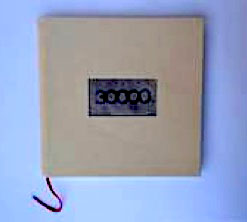
Book 2 30000
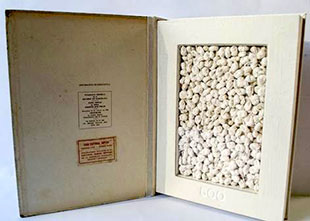
Book 3 500
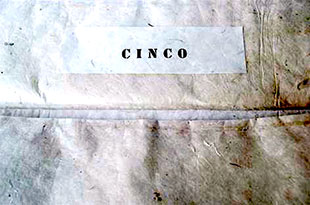
Book 4 Cinco
|
| |
|
day and fog
Poems by Mado Reznik
English Translation by Chris Lovelace and Mado Reznik
Buenos Aires: Mado Reznik, 2016. Edition of 10.
13.75 x 17 x 1.5" custom box with cavities for etchings and the book. Four 4.75 x 6.75" etching windows with roll up shades on dowels. Book: 8.5 x 11", 14 leaves; lightweight paper covers; perfect bound; cord lift and tie. Materials: paper, ink, cloth.
Theresienstadt, a concentration camp established by the SS during WWII near the city of Terezín in occupied Czechoslovakia, was the showplace camp gussied up by the Nazis after D-Day for a visit by Danish and International Red Cross officials. The intent was to dispel notions of exterminations camps. This work commemorates the artist's recent visit to what remains of the camp.
Mado Reznik: "day and fog is part of a journey taken several years ago. It comes from a survey about the Terezín ghetto in the Czech Republic, where art was legally promoted by Nazis but also [pursued] illegally by the prisoners. Terezín was the chosen ghetto to be shown by the Nazis as a tactic to oppose the world opinion about the horrendous and dreadful conditions of the camps. And, so to a certain extent art was promoted and even a huge library of more than 50,000 books was assembled. Both adults and children were involved in survival not only trying to get enough food and warmth but also literature, visual arts, music, theater, philosophy.
"My own personal pictures taken at the ghetto have been transformed into photo etchings. Paper rolls intend to express what we remember but sometimes tend to ignore as if meaning has been compartmentalized. Poems express part of the story in a voice that transcends my own voice. I have chosen different types of paper for that objective: Japanese, Mexican, and Nepal."
(SOLD/Out of Print) |
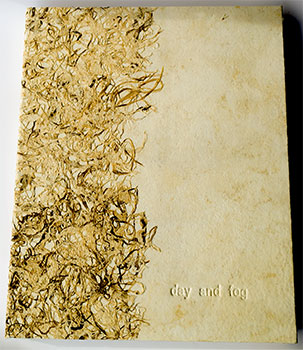 Click image for more
Click image for more |
| |
|
| De los puta confessions [On the professions of strumpets] |
By Mado Reznik
Buenos Aires: Mado Reznik, 2012. Edition of 3.
Box 4.3 x 12.2 x 4.3" containing 9 cubes (7 with text, 2 covered in velvet). Text printed on handmade paper. Text in Spanish. Photogravure intaglio on both Japanese Tengujo paper and handmade paper. Title handwritten on a mirror tipped to underside of lid. Pamphlet with English translation of text included.
Mado Reznik: "This book has been dreamt as a playing poem. Many years ago I traveled to the town where my mother was born looking for her story and my roots. I got acquainted with the woman who ran a Museum of Immigrants. I took several photos from an old Public Record of Prostitutes, which at the time (the early beginning of the last century) was a law, i.e., every woman that worked as prostitute had to be registered. That was made with my first digital camera.
"A couple of years later I selected some of the pictures and I wrote poems about their dreams and secret wishes. With that in mind I decided to put them names of minor Greek goddesses but for one, the very well-known Helena. I always had the idea of making a playing work. So in 2001 I set a digital movie with the pictures and the poems.
"In 2012 I went back to those faces and words and I made this artist book. This is a box with cubes. When the box is opened there is a mirror with the title for the people to see their own image. Each cube has on their sides the texts and two intaglio photogravures both on Japanese Tengujo paper and handmade paper. This superposition creates a depth effect as if it were a holographic image. There are also two velvet cubes that work as jokers or wild cards. In the end all is nothing but chance."
(SOLD/Out of Print) |

Click image for more |
| |
|
Derecho sin Revés
By Mado Reznik
Buenos Aires: Mado Reznik, 2015. Edition of 2.
13.5 x 6"; 3 leaves with pull-out text pages. Recycled women's gloves. Text in Spanish. Bound in cloth boards. Numbered.
Mado Reznik: "This book has been especially created for the celebration of women´s law in my country, Argentina. It plays with the idea that right is right but it also has a setback. Right may seem to be empty (as the gloves seem to be) but that right(s) convey the power to live in a democratic society."
The text translated into English contains statements like these: The right to decide on reproductive life, the number of pregnancies and when to have them. The right to dignity. The right to a life without violence and discrimination. The right to health, education, and personal security. The intent is unmistakable.
(SOLD/Out of Print) |
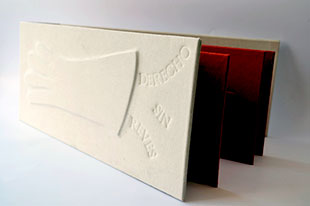
Click image for more |
| |
|
No Thing
By Mado Reznik
Buenos Aires: Mado Reznik. Edition of 2.
6.5" cube. Cloth covered. Text embossed. Numbered.
Mado Reznik: "No Thing is a conceptual book about the idea of nothing (ness). The box contains a series of mirrors that reflects ad infinitum the famous line in William Shakespeare´s King Lear, in which Lear declares: 'Nothing will come of nothing'.
"Whether you talk about love and legacy (like in King Lear), money, or any other concept, you still need to name things. You need to name nothing in order to talk about nothing. To appreciate the whole reflection the viewer needs to approach the box and like inside a paradox the viewer will be immersed in the universe of nothing (ness)."
(SOLD)
|
 Click image for more
Click image for more |
| |
|
Page last update: 05.30.2025
|
